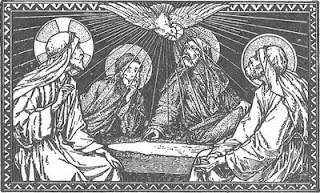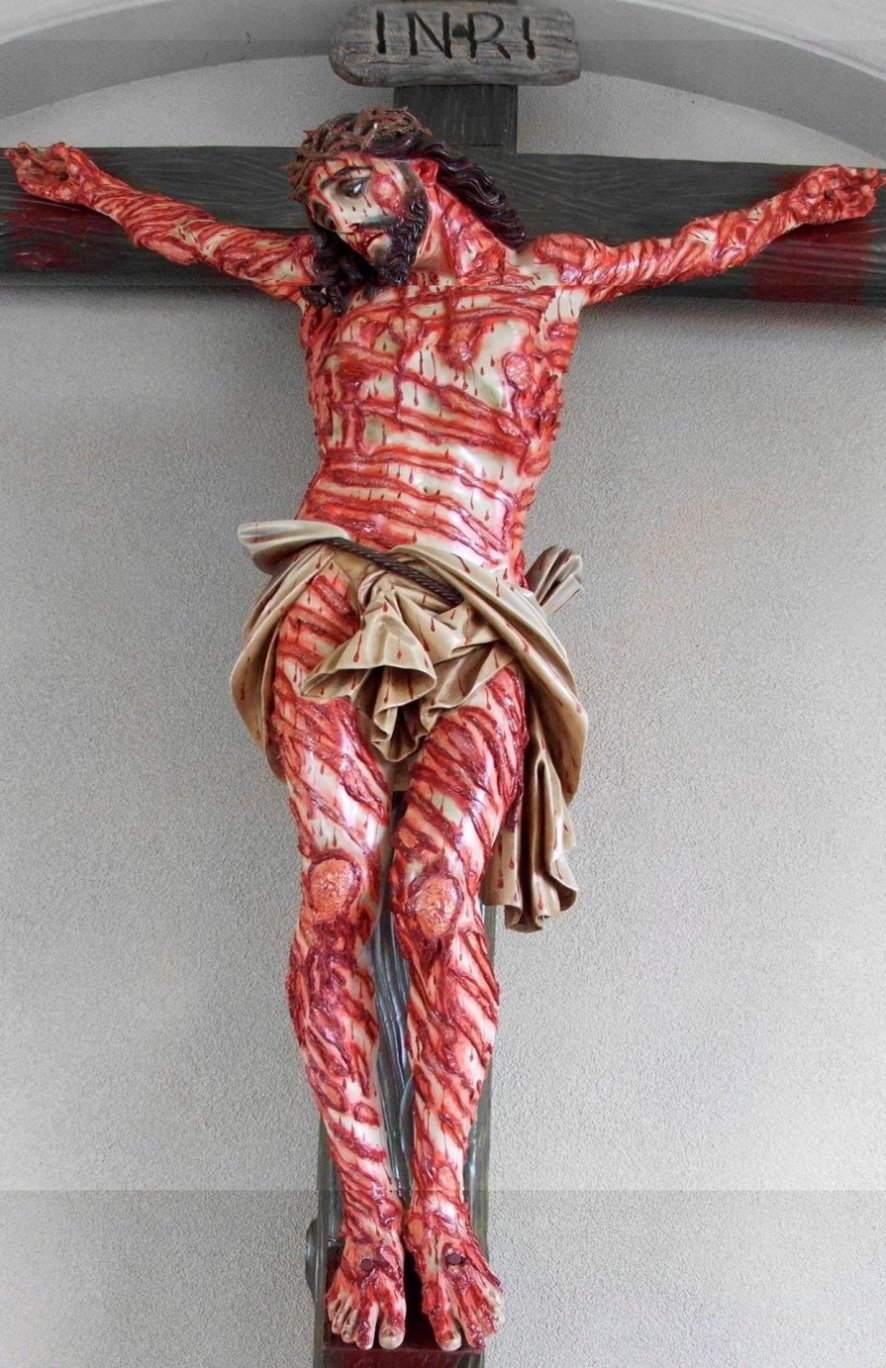This Sunday is the fifth Sunday after Easter and we have two Masses:
11.00 a.m. Sacred Heart, Broughton Hall, Skipton (missa cantata)
12.30 a.m. St. Joseph's, Pakington Street, Bradford
As I promised last week I am reproducing below the second part of Fr. Michael Hall's series of sermons for the Sacred Triduum.
I hope you find it as illuminating as I do. Thanks to Fr. Hall for this. The third part will appear for the Ascension next Thursday for which we have two Masses:
11.00 a.m. Sacred Heart, Broughton Hall, Skipton
5.00 p.m. St. Joseph's, Pakington Street, Bradford
O salutaris Hostia
Good Friday Liturgy
“He shall be led as a sheep to the slaughter, for the Lord has laid
on him the iniquity of us all”
Over these three
days I am looking at the Latin roots of our English word “host”. Last night we saw that there are three such
roots, which makes this one English word so versatile.
Last night we
looked at hospes – the host who
provides hospitality.
Tomorrow we shall
look briefly at hostis – enemy, army,
multitude.
But this afternoon
we look at the Latin word that gives us Catholics the phrase that means so much
to us – hostia – victim or sacrifice.
O salutaris Hostia,
Quae caeli pandis ostium
Bella premunt hostilia
Da robur, fer auxilium
I hope that those
lovely words from the beginning of Benediction are as precious to you as they
are to me. Did you notice another “host”
word in that verse – hostilia- enemy?
O Saving Victim,
opening wide
The gate of heaven to man below
Our foes press hard on every side
Thine aid supply, thy strength bestow.
It could be argued
that most of the epistles of the New Testament are trying to work out the
implications of what Our Lord did in these three days of the Triduum. Nowhere is this more clear than in the
Epistle to the Hebrews, which in 13 densely argued chapters shows how Our Lord
Jesus Christ has fulfilled, and thus replaced, the sacrificial system that was
at the heart of the religion of the Old Testament, not to mention the
priesthood that went with it.
He offers himself
once for all upon the cross, but because of what he had done the night before,
as host of the Last Supper, he gave his Church a way in which the One Sacrifice
could be revisited, re-presented, realized throughout time and space. At each Mass, our Lord, in the person of the
priest, offers himself as the saving victim.
But even using
that word “victim” begs the question – just what does that mean? We live in a
society where, perhaps, the word is cheapened because everyone claims to be a
victim – what is happening to me is someone else’s fault.
Turning to the
Latin victima, we find that it means
a beast for sacrifice - in other words a hostia. But if we dig deeper, and ask where victima comes from, we gain further
illumination.
It may come from
the verb vigeo – to be full of life
(vigor, vigorous). Seems odd to apply
this to a sacrificial animal, but you can’t sacrifice a dead animal! The whole idea is that the life with which
that beast is full is poured out in worship and intercession.
Apply this to Our
Lord. He is the way the truth and the
life, he is the light which gives life to humanity. There is no-one that is more full of life –
more a victima: and that life is poured out on the cross.
It may also be
that the word victima may refer to
the vitta, which was a garland or
headband placed around the head of the sacrificial victim. So popular an image was this that poets and
brides and the Vestal Virgins would wear a vitta
to show that they had been set apart for some noble service.
I hardly need to
join the dots for you here, do I? Our
Lord, the Saving Victim, goes to his cross wearing his own vitta – a twisted crown of thorns.
His oppressors thought that they were having a laugh by giving him a
crown made of thorns, but in fact what they were doing was marking him out as
the hostia, the victima, who would die for the sins of the world.
Just how did those
hours of suffering redeem the world?
That’s perhaps too big a question for this afternoon. But it’s interesting to see that some of the
Latin words that come from Hostia
give us a bit of a hint:
The verb hostire means, among other things, to
make even, to return like for like.
You’ve broken your auntie’s favourite vase, so you buy one just the
same. It carries with it the sense of
reconciliation, of replacement. God was
in Christ, says St Paul, reconciling the world to himself – making things even,
returning it to what it was meant to be.
Hostimentum is a recompense, a requital
– a paying of the bill. Sin and Death,
those spawn of Satan, have a claim on humanity because of Adam’s fall, renewed
by us in each successive generation. But
Christ requites that claim – he pays the bill.
The final word our
Lord speaks from the Cross, in the Greek of St John, is tetelestai – it is finished.
But that word has an alternative meaning. If you went to settle your accounts with a
merchant anywhere around the eastern Mediterranean in those days, he would
write on your bill, tetelestai –
“paid in full”
In the diocese of
Milan, where the ancient Rite of St Ambrose is still celebrated, significant
changes are made to the Mass of the Lord’s Supper. I want, in closing, to tell you about just
one of those.
In a normal
Ambrosian Mass on any other day, the priest will introduce the Lord’s Prayer
with words with which we would be familiar – Praecepitus salutaribus moniti etc.
But listen to what happens on Maundy
Thursday. The
Lord’s Prayer has a special introduction used only on this day,
It is His commandment,
O Lord, which we follow, in Whose presence we now ask Thee…that as we carry out
the truth of the heavenly sacrifice, so we may draw in the truth of the Lord’s
Body and Blood.
I love the play
between “carrying out the truth” and “drawing in the truth”
The sacrifice of
our Lord is now enshrined for ever in heaven. Carrying out its truth is not “just doing it”-
carrying out the motions of the Mass, or this Liturgy -but
literally carrying that sacrifice out of heaven and down to wherever we are gathered
– as in a short while the Cross will be carried out for your veneration. And as we carry it out, the spiritual aroma
of that sweet and fragrant sacrifice fills our nostrils, we draw in our breath
and we are filled with the truth of Our Lord’s Body and Blood.
All praise and
thanks to thee ascend
For evermore, blessed One in Three;
O grant us life that shall not end
In our true native land with the. Amen.
Fr. Michael Hall
Given at Notre Dame, Leeds
Good Friday 2018

:max_bytes(150000):strip_icc()/Pentecost-58b5ca113df78cdcd8bbec91.jpg)


